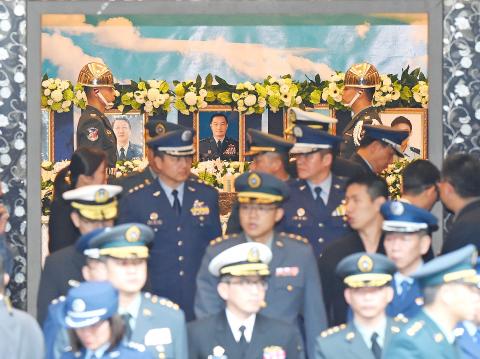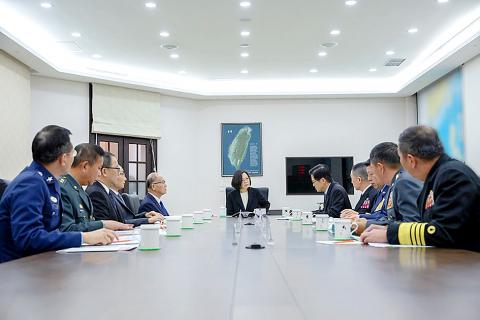Military officers who were killed in a helicopter crash on Thursday are to be posthumously given decorations for their service to the nation, President Tsai Ing-wen (蔡英文) said yesterday at a top-level military and national security meeting at the Presidential Office in Taipei.
Tsai also issued “three assurances” to boost morale.
A UH-60M Black Hawk helicopter, carrying military personnel to Dongaoling Base (東澳嶺) in Yilan County, went down in the mountains of New Taipei City’s Wulai District (烏來) on Thursday with 13 people on board. Eight, including Chief of the General Staff General Shen Yi-ming (沈一鳴), died in the crash.

Photo: Liao Chen-huei, Taipei Times
The meeting started with one minute’s silence for the deceased officers — Shen, Political Warfare Bureau Deputy Director Major General Yu Chin-wen (于親文), Major General Hung Hung-chun (洪鴻鈞) of the Office of the Deputy Chief of the General Staff for Intelligence, Major Huang Sheng-hang (黃聖航) of the Office of the Chief of the General Staff, Chief Master Sergent Han Cheng-hung (韓正宏), pilot Lieutenant Colonel Yeh Chien-yi (葉建儀), copilot Captain Liu Chen-fu (劉鎮富) and crew chief Master Sergeant Hsu Hung-pin (許鴻彬).
Tsai then announced that Shen had been posthumously promoted from a three-star general to a four-star general, as well as awarded the Order of Blue Sky and White Sun with Grand Cordon.
As Han was top of the sergeant rankings he was awarded the Cloud and Banner Medal, the Ministry of National Defense said, while the other officers were each given a posthumous one-rank promotion.

Photo courtesy of the Presidential Office
“Despite our sorrow, we cannot allow national security to lapse for even one day,” Tsai said.
The best way to honor Shen’s memory would be for military personnel to continue with their duties and safeguard the nation, she said, before issuing three assurances.
Under the leadership of acting Chief of the General Staff Liu Chih-pin (劉志斌) and Minister of National Defense Yen De-fa (嚴德發), military affairs are to continue as normal and morale must remain high, she said.
The military must be on heightened alert and to closely observe all military movements in and around the Taiwan Strait, to ensure that the armed forces can respond rapidly to any change in the situation, she said.
The military must conduct thorough equipment inspections and to ensure that all military equipment is combat-ready, she said, adding that there is no room for laxness.
Yen then gave a briefing on the crash and the reaction of China’s People’s Liberation Army.
The public should remain assured of the safety of the Taiwan Strait and that the authorities were looking into the cause of the crash, sources said.
Tsai has instructed the government to provide as much assistance as possible to the families of the deceased, including funeral arrangements, and with compensation payments for families of the deceased and the survivors, sources said.
The president instructed the Taipei Guest House to make an area available for the public to pay their respects to the deceased officers, they said.
Ministry spokesman Shih Shun-wen (史順文) yesterday evening confirmed that the Taipei Guest House would be open from 9am to 9pm over the weekend for the public to pay tribute to the deceased officers.
Additional reporting by CNA

DAREDEVIL: Honnold said it had always been a dream of his to climb Taipei 101, while a Netflix producer said the skyscraper was ‘a real icon of this country’ US climber Alex Honnold yesterday took on Taiwan’s tallest building, becoming the first person to scale Taipei 101 without a rope, harness or safety net. Hundreds of spectators gathered at the base of the 101-story skyscraper to watch Honnold, 40, embark on his daredevil feat, which was also broadcast live on Netflix. Dressed in a red T-shirt and yellow custom-made climbing shoes, Honnold swiftly moved up the southeast face of the glass and steel building. At one point, he stepped onto a platform midway up to wave down at fans and onlookers who were taking photos. People watching from inside

A Vietnamese migrant worker yesterday won NT$12 million (US$379,627) on a Lunar New Year scratch card in Kaohsiung as part of Taiwan Lottery Co’s (台灣彩券) “NT$12 Million Grand Fortune” (1200萬大吉利) game. The man was the first top-prize winner of the new game launched on Jan. 6 to mark the Lunar New Year. Three Vietnamese migrant workers visited a Taiwan Lottery shop on Xinyue Street in Kaohsiung’s Gangshan District (崗山), a store representative said. The player bought multiple tickets and, after winning nothing, held the final lottery ticket in one hand and rubbed the store’s statue of the Maitreya Buddha’s belly with the other,

‘NATO-PLUS’: ‘Our strategic partners in the Indo-Pacific are facing increasing aggression by the Chinese Communist Party,’ US Representative Rob Wittman said The US House of Representatives on Monday released its version of the Consolidated Appropriations Act, which includes US$1.15 billion to support security cooperation with Taiwan. The omnibus act, covering US$1.2 trillion of spending, allocates US$1 billion for the Taiwan Security Cooperation Initiative, as well as US$150 million for the replacement of defense articles and reimbursement of defense services provided to Taiwan. The fund allocations were based on the US National Defense Authorization Act for fiscal 2026 that was passed by the US Congress last month and authorized up to US$1 billion to the US Defense Security Cooperation Agency in support of the

HIGH-TECH DEAL: Chipmakers that expand in the US would be able to import up to 2.5 times their new capacity with no extra tariffs during an approved construction period Taiwan aims to build a “democratic” high-tech supply chain with the US and form a strategic artificial intelligence (AI) partnership under the new tariffs deal it sealed with Washington last week, Taipei’s top negotiator in the talks said yesterday. US President Donald Trump has pushed Taiwan, a major producer of semiconductors which runs a large trade surplus with the US, to invest more in the US, specifically in chips that power AI. Under the terms of the long-negotiated deal, chipmakers such as Taiwan Semiconductor Manufacturing Co (TSMC, 台積電) that expand US production would incur a lower tariff on semiconductors or related manufacturing